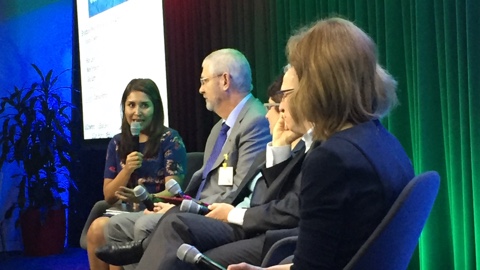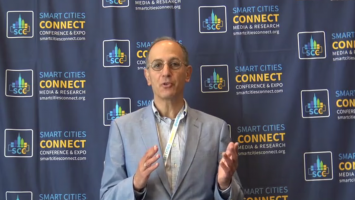
If you watched election footage – and how could you avoid it – you probably noticed that behind the memes, skits, promises, and debates lay an undeniable truth: rural America wants to be heard.
With diverse day-to-day roles and a collective understanding of the technological and infrastructure challenges in the expansion of broadband, four panelists spoke today at Transforming Communities: Broadband Goals for 2017 and Beyond in Washington, D.C. They participated in a moderated discussion, evaluating this moment in time and making recommendations for the incoming administration.
“Eight years ago, people were still arguing that broadband wasn’t essential to American society. That’s changed,” Gigi Sohn, counselor to the chairman at the Federal Communications Commission said. “What’s important now is that everyone has to have [broadband], whether you’re poor or rural or urban or rich. Now, how do we get it to them at the right speed and the right price? That’s the conundrum we haven’t answered, yet.”
If the Obama era was a time of education and awareness for broadband and its capabilities, Trump’s must be a time of implementation. With promises to invest significantly in infrastructure, those hopes seem well-founded. But how much can be done at the federal level?
The panel provided ideas: lower the cost of capital, ensure local banks are active in deals, and condition open access to funding. A broad communications network and a no pay-to-play provision would encourage necessary competition and merit-based financial awards.
In addition to making cash investments, a new administration must support leaders at the local level, as they tackle these challenges, daily. Fiber cables are expensive to run, and it’s not economic for big providers to serve sparsely populated areas, making competition rare. Taking government money comes with a cumbersome train of responsibilities, but local choice is critical.
“As everyone who’s ever negotiated a deal knows, if you only have one option, you’re not going to get a very good deal,” lamented Blair Levin, senior fellow with the Metropolitan Policy Program at Brookings.
“Blair and I are singing a hymn about the power of cities to get this done, but it has to be done in the right way,” Susan Crawford followed. She co-directs the Berkman Center and is a John A. Reilly Clinical Professor of Law at Harvard Law School.
In addition to the financial and structural challenges of making broadband available to all, there are also communication barriers between a distrustful rural congregation and the government. Perhaps another tally in the local column, credible leadership and a common language are vital to progress.
Speaking from experience in his town of Winthrop, Ericson chimed in: “what we did was we stood up in front of people and gave them the facts. ‘Here’s what the future looks like. You’re going to need more bandwidth; you’re going to need more fiber.’”
However, Levin provided that communication may be the real villain in rural neglect. “There is a political problem and also a translation problem. There’s a big ‘get your hands off my Medicare problem’ in rural states,” Levin said. “We shouldn’t buy into this myth that we have somehow ignored rural folks with regards to broadband.”
As the guard changes and President-elect Trump steps into office, the panel hopes he and his appointees will work on basic infrastructure, listen to both those who did and did not vote for him, encourage local leadership, and consider continued regulation thoughtfully.
“You can’t make America great again without broadband. In the same way that the nation needs a broadband plan, local governments need it too,” Levin said.
As with all progress, successful transitions are made with both sound planning and engaged citizens. Continue the conversation on Twitter #bbgoals and with hosts Next Century Cities, US Ignite, and Schools, Health and Libraries Broadband Coalition.


